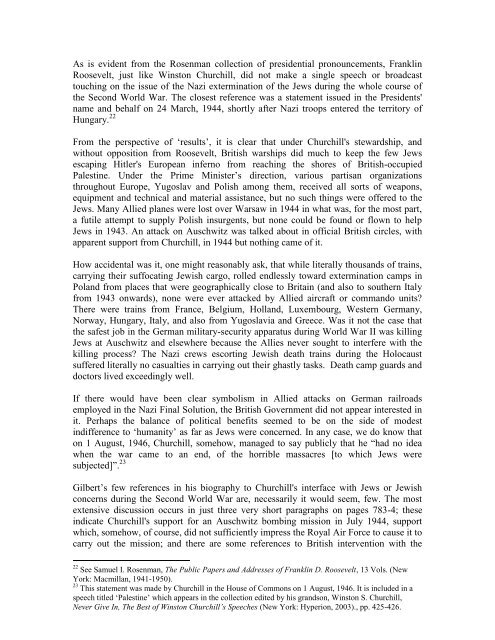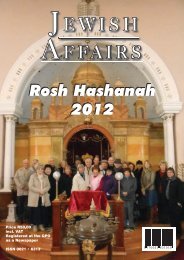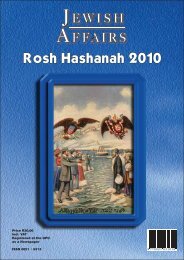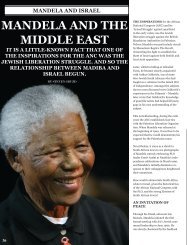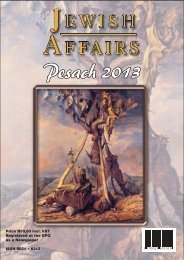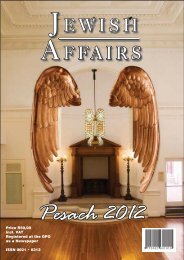ja chank 2008 - South African Jewish Board of Deputies
ja chank 2008 - South African Jewish Board of Deputies
ja chank 2008 - South African Jewish Board of Deputies
Create successful ePaper yourself
Turn your PDF publications into a flip-book with our unique Google optimized e-Paper software.
As is evident from the Rosenman collection <strong>of</strong> presidential pronouncements, Franklin<br />
Roosevelt, just like Winston Churchill, did not make a single speech or broadcast<br />
touching on the issue <strong>of</strong> the Nazi extermination <strong>of</strong> the Jews during the whole course <strong>of</strong><br />
the Second World War. The closest reference was a statement issued in the Presidents'<br />
name and behalf on 24 March, 1944, shortly after Nazi troops entered the territory <strong>of</strong><br />
Hungary. 22<br />
From the perspective <strong>of</strong> ‘results’, it is clear that under Churchill's stewardship, and<br />
without opposition from Roosevelt, British warships did much to keep the few Jews<br />
escaping Hitler's European inferno from reaching the shores <strong>of</strong> British-occupied<br />
Palestine. Under the Prime Minister’s direction, various partisan organizations<br />
throughout Europe, Yugoslav and Polish among them, received all sorts <strong>of</strong> weapons,<br />
equipment and technical and material assistance, but no such things were <strong>of</strong>fered to the<br />
Jews. Many Allied planes were lost over Warsaw in 1944 in what was, for the most part,<br />
a futile attempt to supply Polish insurgents, but none could be found or flown to help<br />
Jews in 1943. An attack on Auschwitz was talked about in <strong>of</strong>ficial British circles, with<br />
apparent support from Churchill, in 1944 but nothing came <strong>of</strong> it.<br />
How accidental was it, one might reasonably ask, that while literally thousands <strong>of</strong> trains,<br />
carrying their suffocating <strong>Jewish</strong> cargo, rolled endlessly toward extermination camps in<br />
Poland from places that were geographically close to Britain (and also to southern Italy<br />
from 1943 onwards), none were ever attacked by Allied aircraft or commando units?<br />
There were trains from France, Belgium, Holland, Luxembourg, Western Germany,<br />
Norway, Hungary, Italy, and also from Yugoslavia and Greece. Was it not the case that<br />
the safest job in the German military-security apparatus during World War II was killing<br />
Jews at Auschwitz and elsewhere because the Allies never sought to interfere with the<br />
killing process? The Nazi crews escorting <strong>Jewish</strong> death trains during the Holocaust<br />
suffered literally no casualties in carrying out their ghastly tasks. Death camp guards and<br />
doctors lived exceedingly well.<br />
If there would have been clear symbolism in Allied attacks on German railroads<br />
employed in the Nazi Final Solution, the British Government did not appear interested in<br />
it. Perhaps the balance <strong>of</strong> political benefits seemed to be on the side <strong>of</strong> modest<br />
indifference to ‘humanity’ as far as Jews were concerned. In any case, we do know that<br />
on 1 August, 1946, Churchill, somehow, managed to say publicly that he “had no idea<br />
when the war came to an end, <strong>of</strong> the horrible massacres [to which Jews were<br />
subjected]”. 23<br />
Gilbert’s few references in his biography to Churchill's interface with Jews or <strong>Jewish</strong><br />
concerns during the Second World War are, necessarily it would seem, few. The most<br />
extensive discussion occurs in just three very short paragraphs on pages 783-4; these<br />
indicate Churchill's support for an Auschwitz bombing mission in July 1944, support<br />
which, somehow, <strong>of</strong> course, did not sufficiently impress the Royal Air Force to cause it to<br />
carry out the mission; and there are some references to British intervention with the<br />
22 See Samuel I. Rosenman, The Public Papers and Addresses <strong>of</strong> Franklin D. Roosevelt, 13 Vols. (New<br />
York: Macmillan, 1941-1950).<br />
23 This statement was made by Churchill in the House <strong>of</strong> Commons on 1 August, 1946. It is included in a<br />
speech titled ‘Palestine’ which appears in the collection edited by his grandson, Winston S. Churchill,<br />
Never Give In, The Best <strong>of</strong> Winston Churchill’s Speeches (New York: Hyperion, 2003)., pp. 425-426.


